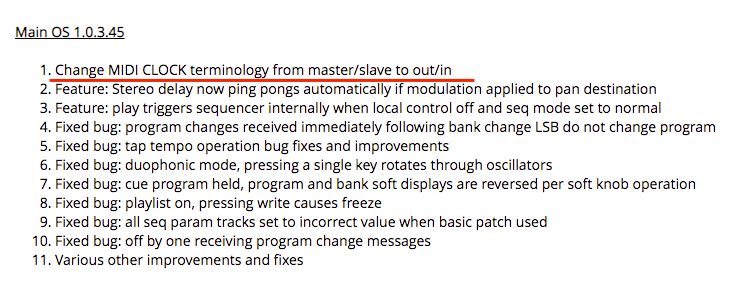To agree on a change, it’s helpful not just to agree on what you’re removing, but also its replacement. So, here’s an easy solution: in, out.
Last week, I tried to amplify a perspective I was hearing a lot in private, but not seeing as much in public (apart from a Twitter thread or two). The consensus from many in tech was simple: we should stop using master and slave as terms in music technology.
I realize that while I was clear about what was wrong with those terms, there wasn’t yet clarity about the replacements. So let’s be as clear as possible.
IN and OUT. In the case of things that can be easily changed – firmware, and software – in and out are the simplest solutions. They also can be translated into other languages without acquiring other problematic associations.*
In and out were quietly added to new firmware from Sequential – aka the company founded by Dave Smith, who was one of the leads of the original MIDI protocol specification. If someone at the MIDI Manufacturers’ Association would like to dust off the MIDI specification 1.0 document, it hasn’t otherwise been updated since 1996, so perhaps it’s time, anyway.

In and out are better, easier to understand, clearer to beginners, more consistent with other uses of in and out (MIDI data, for instance), and adapt to situations where you might route clock signal both into and out of the device. There’s literally no need for translation because even if you spent years with “master” and “slave,” it’s already more immediately clear what it means if I say you want to route clock from a source into a keyboard and then out to a third device.
I would love for that to be the end, but because these words begin with “i” and “o”:
MAIN and SECONDARY. In contexts like printed circuit boards and specification sheets that refer to abbreviations (M) and (S), at least in English, main and secondary work as replacements. These are also more clear while also being more adaptable to different situations.
Host and client are already in-use networking terms, so if you’re describing that context, they’d remain anyway.
I was frankly stunned by the level of resistance. It’s hard not to read people getting that upset by terms and think that what they’re really defensive about is racism.
This absolutely doesn’t solve deeper problems. It shouldn’t give anyone any illusions about the challenges ahead in the music technology field. Our industry doesn’t reflect the diversity of the communities we work in, or the customers we serve. It’s overwhelmingly white and male. It’s dominated by speakers of the English language – hence, yeah, this site and how I’m writing now. It’s biased toward people with particular resources and education.
But a good way to see if you can make bigger changes is to start with smaller ones. All you really need to know about changing clock terms is this – we’re better off not bringing up the spectre of slavery in our daily work, and the new terms are clearer and easier than the old ones.
And done. (Well, apart from whatever next batch of comments I get calling this post Communist and a Fascist, but hey, it’s the Internet.)
And, uh, yeah, I’m really sorry about “leader” and “follower.” Just really don’t translate those into German. Because in German, you’d sa— oh no. No, no, no, no. I got a bit confused because everyone keeps mentioning the war.
Anyway, I do appreciate the feedback. Even the heated feedback and controversy. You wind up with a better solution – break stuff first, fix it. Even little stuff. If you’ve ever worked on software or hardware engineering, or documenting technology, this is literally how your days always go. So if we obsess over what a knob should be called, or the way its range is coded or the resistor we use on a filter, you bet we can afford the time to fix this – and that we might just have the patience and temerity to change bigger, more meaningful things, too.
That is, once we get everything in sync.
Feature image (CC-BY) Dejan Krsmanovic.